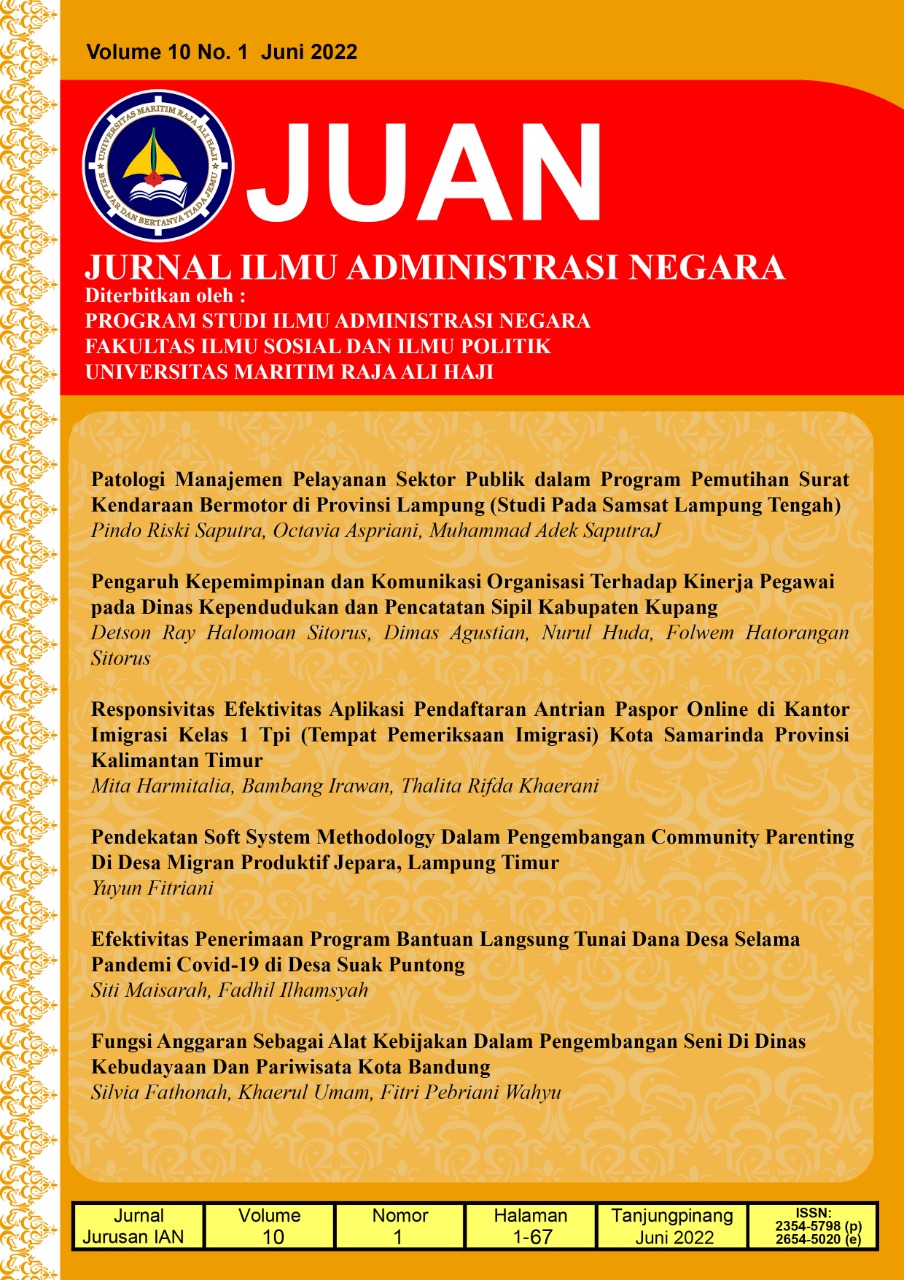EFEKTIVITAS APLIKASI PENDAFTARAN ANTRIAN PASPOR ONLINE DI KANTOR IMIGRASI KELAS 1 TPI (TEMPAT PEMERIKSAAN IMIGRASI) KOTA SAMARINDA PROVINSI KALIMANTAN TIMUR
DOI:
https://doi.org/10.31629/juan.v10i1.3779Keywords:
Effectiveness, APAPO, ImmigrationAbstract
Currently, the world is experiencing an era of disruption. This encourages changes in public sector business processes that impact old business models that must be adapted to the times, so service ideology must also follow the technological era. This study aimed to analyze the effectiveness of using an online registration application at the Kantor Imigrasi Kelas I TPI Samarinda. The method used in this study uses a qualitative descriptive approach with observation, interviews, and documents techniques. It uses the Mary de Chesnay Qualitative Data analysis model with the stages of data collection, raw data description, data reduction, data categorization, and constructing categorical relationships. The results showed that the implementation of APAPO at the Kantor Imigrasi Kelas 1 TPI Samarinda has been running effectively. This is illustrated by the absence of queues, the quota of passport applicants at APAPO provided is always available, and there is no brokering practice. APAPO outreach has been held through social media such as Instagram, Facebook, Twitter, and on print media in the form of newspapers, brochures, pamphlets, banners, and display screens. The existence of APAPO at the Kantor Imigrasi Kelas 1 TPI Samarinda really helps the community be more effective in making passports and becomes more efficient because it saves time and costs compared to before using the offline queue. Another finding that is no less important is that there are inhibiting factors in applying APAPO. At the same time, the obstacles are network quality constraints, applications that sometimes error, websites that cannot be reached to register online, and APAPO, which can only be uploaded via mobile phones with the Android system and literacy. Digital society is still low.
Downloads
References
ALNE, M. F. (2019). Efektivitas Kantor Imigrasi Kelas 1 Pekanbaru Dalam Penggunaan Aplikasi Pendaftaran Antrian Paspor Online. Universitas Islam Negeri Sultan Syarif Kasim Riau.
Irawan, B., Nizar, M., Akbar, P., & Khanz, A. H. (2020). Inovasi Pelayanan Permohonan Pengajuan Izin Dinas Penanaman Modal dan Pelayanan Terpadu Satu Pintu (DPMPTSP) Kota Samarinda. Matra Pembaruan: Jurnal Inovasi Kebijakan, 4(2), 135–145.
Jayatarsa, N. (2021). ANALISIS EFEKTIVITAS SISTEM ANTRIAN ONLINE DALAM MENGURAI KEPADATAN ANTRIAN PASIEN PADA PUSKESMAS SENTOSA BARU. Jurnal Teknovasi: Jurnal Teknik Dan Inovasi, 8(1), 8–17.
Kharisma, D., & Yuniningsih, T. (2017). Efektivitas Organisasi dalam Penyelenggaraan Pelayanan Tanda Daftar USAha Pariwisata (Tdup) Dinas Kebudayaan dan Pariwisata Kota Semarang. Indonesian Journal of Public Policy and Management Review, 6, 770–781.
Mutiarin, D., & Zaenudin, A. (2014). Manajemen birokrasi dan kebijakan: penelusuran konsep dan teori. Pustaka Pelajar. https://scholar.google.com/scholar?hl=id&as_sdt=0%2C5&q=Mutiarin+%26+Zaenudin%2C+2014&btnG=
Steers, R. M., Ungson, G. R., & Mowday, R. T. (1985). Managing effective organizations. Kent Pub. Co.
Sugiyono. (2020). Metode Penelitian Kualitatif. Alfabeta.
Supriyono, B. (2018). Empat Pilar dalam Prinsip Pelayanan Publik Guna Perwujudan SDGs. FIa Universitas Brawijaya. https://fia.ub.ac.id/blog/berita/empat-pilar-dalam-prinsip-pelayanan-publik-guna-perwujudan-sdgs.html
Tasya, P., Purwanti, D., & Amirulloh, M. R. (2020). IMPLEMENTASI APLIKASI PENDAFTARAN ANTRIAN PERMOHONAN PASPOR ONLINE Implementation of Online Passport Application Queue Registration Application. Dinamika: Jurnal Ilmiah Ilmu Administrasi Negara, 7(2), 350–363.
Tyas, D. L., Budiyanto, A. D., & Santoso, A. J. (2016). Pengukuran Kesenjangan Digital Masyarakat Di Kota Pekalongan. Seminar Nasional Teknologi, Informasi, Dan Komunikasi (SENTIKA), 590–598.
Downloads
Published
Issue
Section
License
You are free to:
- Share — copy and redistribute the material in any medium or format for any purpose, even commercially.
- Adapt — remix, transform, and build upon the material for any purpose, even commercially.
- The licensor cannot revoke these freedoms as long as you follow the license terms.
Under the following terms:
- Attribution — You must give appropriate credit, provide a link to the license, and indicate if changes were made . You may do so in any reasonable manner, but not in any way that suggests the licensor endorses you or your use.
- ShareAlike — If you remix, transform, or build upon the material, you must distribute your contributions under the same license as the original.
- No additional restrictions — You may not apply legal terms or technological measures that legally restrict others from doing anything the license permits.














